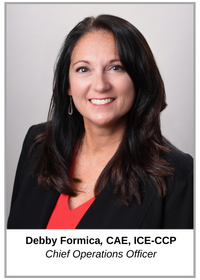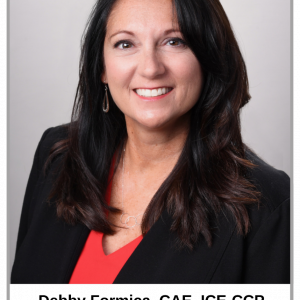Posted on 04/19/2022 - 11:44 AM by Debby Formica, CAE, ICE-CCP Chief Operations Officer, CCMC
Getting people back to work, to play and to living—amidst the pandemic

By Debby Formica, CAE, ICE-CCP
Chief Operations Officer, CCMC
Are we there yet?
Just a few weeks ago, the Centers for Disease Control and Prevention announced that 99% of Americans live in counties where COVID-19 cases are low enough that indoor masks are not necessary.[1] At the same time—and mere months after the omicron strain of the virus raced around the world and infected millions—a similar “stealth omicron” variant is on the rise.
Indoor masking may no longer be required in most places, but we have not yet arrived in the post-pandemic era. Nevertheless, this is the time to recognize the board-certified disability management specialists (CDMS) who advance clients on their journey to wellness, advocate for them and inspire us all with their perseverance and commitment to excellence. The Commission supports both the professional case manager through the CCM credential and disability management specialists through the CDMS credential.
Although coronavirus cases requiring hospitalizations have dropped significantly, there is little doubt that CDMS certificants have persevered in these front-line roles to address the pandemic’s effects on workers. Restaurants and movie theaters are filling, hotels and airlines are busy and businesses are calling employees back to in-person settings. But aspects of the pandemic—changes to the way we work in particular—linger.
In a recent survey of CDMS certificants, a third of respondents said that over-work and long hours are the biggest problem they foresee over the next year. Their primary stressor is keeping up with local mandates related to COVID-19, but staff shortages are also a significant concern (cited by 41% of respondents).
Despite the encouraging public health news from the CDC, we know that the way we work has fundamentally changed, and new challenges will remain for some time to come. Many changes have the potential to impact both physical and mental health. For example, work from home tested the boundaries that customarily provide a buffer between family life and workplace stress. Many remote workers report that they put in more hours now than they did before the pandemic. As the 40-hour work week expands, so does the incidence of employee burnout.[2]
However, the pandemic taught businesses that work from home has its benefits, and a number of companies are adopting home-based or hybrid schedules as the norm for the foreseeable future. While most employees like the flexibility (58% of CDMS respondents say continuing remote work is a net positive), many workers miss the camaraderie and team culture they experienced before the pandemic. In fact, the majority of CDMS survey respondents report that their staff meetings have gone virtual. Work from home introduces its own mental and physical health challenges that CDMS professionals in particular must address—from isolation and increased stress to home offices that aren’t ergonomically designed.
Now is the time the knowledge and skills that CDMS certificants bring to address these complex human capital issues is most valuable. With the effects of long COVID illness affecting as many as 30% of all those who get the virus, there is new territory to navigate in terms of employee accommodations, leave management and absence management. With a CDMS certificant on the team, employers can be confident that employees suffering from effects of COVID will have the support and resources they need to get back to work, back to play and back to living.
While the long-term physical effects of COVID-19 are yet to be fully understood, many of the symptoms—fatigue, mental fog and light sensitivity, for example—are familiar. CDMS certificants have exhibited agility in helping employers accommodate needs so employees can stay productive on the road to recovery. The Commission has developed various resources addressing long COVID, return-to-work and absence management.
Board-certified disability management specialists help clients navigate the uncertainty, pave the way for needed resources and support and inspire hope for a healthier, more productive future. We aren’t there yet, but these front-line experts are lighting the path to recovery, a safe and accepting workplace and a brilliant post-pandemic tomorrow.

